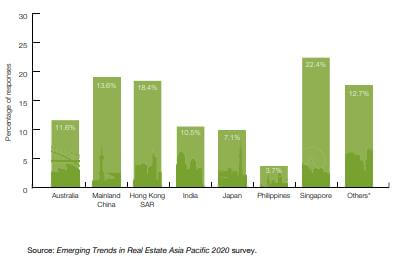
Sign up to receive latest insights & updates in technology, AI & data analytics, data science, & innovations from Polestar Analytics.
Technology disruption has transformed the social, economic, and environmental aspects of every industry, but real estate had a slow growth path. The real estate industry has traditionally been a technology laggard, with antiquated systems, ad-hoc processes and manual documentation ruling the roost.
However, things are changing, with innovation and tech disruption set to change the fundamental paradigms of the real estate sector. From the last few years, Big Data in Real Estate has revolutionized the dynamics of how businesses operate both outside and inside of the business environments.
According to a report, the population all around the world is expected to reach 9 billion by 2050. The overcrowding of the population, due to reasons such as - globalization, migration, increasing urban population, etc., have led to a scarcity of land and are the major forces accelerating growth in the real estate industry. In the last five years, the industry has experienced a 33% hike in countries like India and China.

With the growth and advancing technologies, the volume of market data and the list of competitors are constantly increasing in the domain of real estate. For being the future and lead the competitors, the real estate organizations need to answer the critical pain points-
– How to strengthen the application of technologies to deal with future customer expectation insights?
The market data talks about the property value based on the market conditions like selling price in a particular geographic region, amenities, geographic conditions, the demand and list of properties sold from a group of properties for sale, increase and downfall in population, and more. The market data plays a significant role in sales closure and comparison. With massive data explosion and digital transformation, the real-time accessibility of the data has been increased.
The harnessing of digital data after the digital revolution has been more complex than before. The traditional statistical tools in real estate had limitations in resolving these datasets. By leveraging the potential of big data tools integrated with other technologies, organizations can collect, aggregate, summarize and analyze the datasets to perform various business functionalities.
In real estate, data analysis can play a crucial role in picking up the apt deal with minimal risks. The huge volumes of digital and historical data collated by real estate owners and their users can be leveraged by big data tools, embedded with advanced Artificial Intelligence technologies, to provide advantages like-
Big data assists real estate in faster workflow by advising appropriate and profitable projects/properties for their customers.
The risk of choosing the erroneous property is minimal.
Utilizing predictive and sentiment analysis, the customized and filtered properties for the individual customer provide customized offering, better clustering and gazing the market sentiments for the type of properties, localities, benefits/ amenities.
By analyzing significant data insights on forecaster future price fluctuations and real-time regional price analysis, the real estate organizations can collaborate and offer Personalized insurance cover for every customer in real-time by quoting future value.
Understand your real estate workflows and align them to a strategic, tech-enabled growth strategy for more enhanced customer engagements.
REAL-ESTATE ANALYTICS CONSULTANTEvolving technologies unfolding new ways of visualization and data representation. In today’s ultra-competitive online world, every business uses a mobile-based or web-based application of customer interactive enterprise services. For better client engagement and communication, the data is integrated and classified into a set of customized filters. According to a report, in real estate, 90% of decisions are made based on the data. The presentation of data implies the fate of an organization, which may offer a business lead, or it may lead to closure of the deal. The real-time information should be demonstrated in a sophisticated and authentic way for better customer engagements and client understanding. The organizations like Airbnb are leveraging AI-enabled analytical tools for more enhanced customer engagements to do a profitable business.
AI-enabled Advanced filters gives real-time data access to customers via an internet-enabled device. The advanced search filters provide information beyond the property details, which include- geographical dynamics such as- 3D property visualization, live location tracking, nearby restaurants, property value, entertainment & theme parks, public places, lifestyle-related information, the balance of economic and social life in that geography, society amenities, and more. By understanding and addressing customer requirements, the real estate business can increase customer-centricity and higher customer engagement.
The core objective of the real estate industry is to meet their return on investments in less time to optimize their revenue in the long term. Big data-enabled analytical tools, integrated with advanced technologies, offer better growth in all functionalities of real estate, which can drive greater revenue results for an organization. By reducing the risk in investments, the future value of the business can be enhanced.
Considering these use cases, it can be witnessed that future digital intelligence will alter the business practices and strategies related to real estate by a shift in their responsibility, risk, and adequately of their customers/services. The importance of big data has awakened the interest of international real estate owners on how an organization operates and coordinates with its customers to meet the changes mentioned above. Numerous real estate businesses are implementing big data to their competitors in the revolution of Industry 4.0. Real estate is evolving from system management and building to an integrated manager of space and systems. And the big data analytical integration would be the first step towards the new digital era.
The financial metrics of Real Estate are constantly fluctuating. Property prices can hike or come down depending on the market conditions. This inherent risk is one of the main pitfalls when dealing with the Real Estate market. But thanks to Big Data, in the current scenario, people can predict market trends now. Using the information available and the various analytical and visualization tools like - Microsoft Power BI, Qlik, and tableau that Big Data offers, Real Estate organizations can predict trends and explain them to their clients in a visually attractive and easy to understand way. In this manner, Real Estate organizations can improve their relationship with their clients and enhance their reputation in the local market.
In the current scenario, technologies are barely scratching the surface of the real estate sector. Big data analytics will transform the landscape of the real estate industry for buyers, sellers, and real estate companies themselves. It’s crucial to know and understand how this technology works, and its potential is crucial moving forward.
In the coming times, it will become a ubiquitous part of our lives. So, if you are ready to start your analytics journey and want to avail phenomenal customer experiences, increase your conversions, and stay ahead of your competitors, then we are here to help. Reach out to us to get a consultation with one of our experts and learn more about the possibilities of real estate technology. Contact us today.
About Author

Content Architect
The goal is to turn data into information, and information into insights.